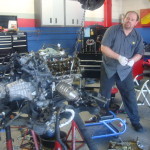Posted on 10/22/2013

We had an older nice German vehicle that was towed in because of an engine fire this month. The repair bill was well over $2000 to replace the composites that were burned. The sad news was this was so preventable. The valve cover gasket (the gasket on the very top of the engine) was leaking oil. The owner was aware that something was amiss because of a strange odor that was being given off from under the engine compartment. A burning smell, even after the vehicle was shut off. As time progressed, this smell got more and more pungent. The intention was to have this checked out but wasn’t checked and repaired until disaster set in. The pools of oil, heated by the exhaust manifold caught fire. The good news, it was a small fire and didn’t do much damage as fires go. The even better news, no one was injured. Your vehicle is a very complicated piece of machinery, incredible amounts of components all working together to provide you with a safe and comfortable ride ... read more
Posted on 10/4/2013

Fall is here; time to get prepared for the rains and winter. Rain, snow, and ice all come with fall and winter. Your tires are your first line of defense between you and the road. Poor tires are just plain dangerous for you and the other people on the road. Make sure your tires are in good condition. Check your tire pressure, the pressure is determined by the automobile manufacturer, not the tire company. You will find your recommended tire pressure on the driver’s door jamb, glove box lid or in your owner’s manual. When inspecting tires, make sure the wear pattern across the tire is ever. If not, an aliment is imperative. A vehicle with poor alignment wears out tires quickly and doesn’t handle properly Coolant check, 50-50 mixture of antifreeze/water. That will bring it down to -34 the recommended level for winter and so the cooling system doesn’t corrode and rust. Battery check. A battery receives its electric energy ... read more
Posted on 9/24/2013

If you have read my column much, you know that I love gadgets. I have acquired a 2014 vehicle that has one of the newest gadgets to enter the car market. I believe this forward looking duel camera system will be standard in most vehicles in the future. This system has a camera on each side of the rear view mirror that scans the road ahead for hazards, vehicles and reads the painted lines on the road. The camera’s information is feed into a computer and the outputs include many. This system has the ability to chime a chime, control the throttle, put messages on the display panel, control your cruise control and put on the brakes firmly. In day to day use, I have really enjoyed this. The chime goes off when I get close or over a painted line without using my turn signal is nice. I do need to be reminded to always use my turn signal and that I’m getting close to the painted line on the side of the road. The feature that I really like is the chime a ... read more
Posted on 7/25/2013

It is now summer, the time for vacations and lots of car travel. Car travel has been going up in popularity the past few years, visiting some of the great spots in the US. Getting your vehicle ready for a trip during the hot weather can make a vacation much more stress free. This is most important for vehicles over 80,000 miles or those who have not taken good preventive care of their car. The most important focus should be the cooling system of your vehicle. About 75% of all major engine damage happens when an engine overheats. The cooling system is one of the largest systems of your vehicle. Your repair shop should pay special attention to all the cooling hoses, water pump, radiator and other parts of the system. Newer vehicles use a lot of plastic in the cooling system that gets brittle with age. If one plastic part breaks, it is a very good idea to replace all of the plastic parts of the cooling system at once. That includes a lot of wate ... read more
Posted on 6/13/2013

In the 1950’s and 60’s, tune-ups were done every 5000-7000 miles, coolant was flushed every fall and oil changes every 2000, with engines reaching 100,000 miles at most. With today’s more precisely built engines, it’s not unusual for one to reach 300,000 miles with regular maintenance. But what kind of maintenance should modern cars have, and how does one maintain a vehicle for the fewest dollars per mile to drive it? For starters, how often should oil services be preformed? Some manufacturers are recommending up to 18, 000 miles on oil changes, other sources say every 3 months, or every 3000 miles. Some manufactures are recommending that their transmission never needs service. There are documented cases with Japanese and European car engines slugging up and needing major repair after fewer than 50,000 miles, even though oil service were done in the prescribed factory times. With lifetime transmission fluid, an instructor who worke ... read more